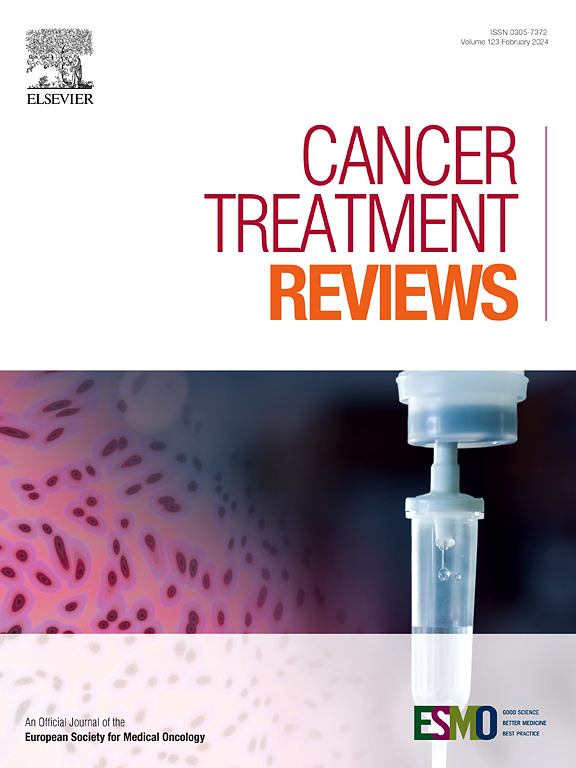Diagnosis and management of dedifferentiated liposarcoma: A multidisciplinary position statement
IF 9.6
1区 医学
Q1 ONCOLOGY
引用次数: 0
Abstract
Dedifferentiated liposarcoma (DDLPS) is a malignant mesenchymal neoplasm in desperate need of novel therapeutic approaches. Often occurring in conjunction with well-differentiated liposarcoma (WDLPS), DDLPS can behave more aggressively and exhibits a significant risk for developing recurrence or metastatic disease when compared to its well-differentiated counterpart. A multidisciplinary approach is critically important, particularly for patients with localized disease, as disease presentations are often complex, and the management of patients has become increasingly nuanced as treatment approaches have become more refined. Expert pathology review and appropriate application of diagnostic molecular techniques are key components of DDLPS diagnosis and also reflect an improved understanding of the underlying pathogenesis of the disease. Systemic therapies remain limited for DDLPS, but novel therapies targeting important underlying molecular drivers have resulted in ongoing clinical trials aiming to improve outcomes for patients with advanced disease. In recognition of the increased activity and interest within the DDLPS field, a multidisciplinary group of nationally recognized experts in medical oncology, surgical oncology, radiation oncology, and pathology was convened to summarize key insights. This position paper highlights important points from the meeting and provides evidence-based recommendations for practicing clinicians.
诊断和处理已分化脂肪肉瘤:多学科立场声明。
未分化脂肪肉瘤(DDLPS)是一种恶性间质肿瘤,急需新型治疗方法。DDLPS通常与分化良好的脂肪肉瘤(WDLPS)同时发生,与分化良好的脂肪肉瘤相比,DDLPS的侵袭性更强,复发或转移的风险也更大。多学科治疗方法至关重要,尤其是对局部疾病患者而言,因为疾病的表现往往很复杂,而且随着治疗方法的不断完善,对患者的管理也变得越来越微妙。病理专家的审查和分子诊断技术的适当应用是 DDLPS 诊断的关键要素,同时也反映了人们对该疾病潜在发病机制的进一步了解。针对 DDLPS 的系统疗法仍然有限,但针对重要潜在分子驱动因素的新型疗法已导致正在进行的临床试验,旨在改善晚期患者的预后。鉴于 DDLPS 领域的活动和兴趣日益增加,一个由国内知名的肿瘤内科、肿瘤外科、肿瘤放射科和病理科专家组成的多学科小组召开了会议,以总结关键见解。本立场文件重点介绍了会议的重要观点,并为临床医生提供了循证建议。
本文章由计算机程序翻译,如有差异,请以英文原文为准。
求助全文
约1分钟内获得全文
求助全文
来源期刊

Cancer treatment reviews
医学-肿瘤学
CiteScore
21.40
自引率
0.80%
发文量
109
审稿时长
13 days
期刊介绍:
Cancer Treatment Reviews
Journal Overview:
International journal focused on developments in cancer treatment research
Publishes state-of-the-art, authoritative reviews to keep clinicians and researchers informed
Regular Sections in Each Issue:
Comments on Controversy
Tumor Reviews
Anti-tumor Treatments
New Drugs
Complications of Treatment
General and Supportive Care
Laboratory/Clinic Interface
Submission and Editorial System:
Online submission and editorial system for Cancer Treatment Reviews
 求助内容:
求助内容: 应助结果提醒方式:
应助结果提醒方式:


